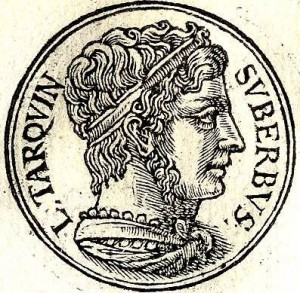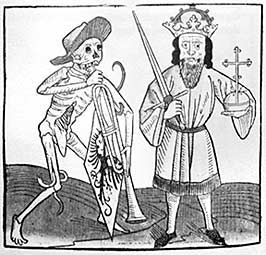Whoever observes how political rulers currently operate–how they ambitiously usurp the dominions of others, how they neglect the good governance of their own country–might assume that they function believing that there is no God (or at least that he doesn’t care a fig for the world), or that these rulers think that they are exempt from God’s laws and power. But the wonderful obstruction of their strategies that comes at the height of their hubris is so obvious that it is impossible to deny that there is a God and or that he exercises a careful watch over the world. God’s word is so plain that no ruler could deny that he or she ought to obey God and be subject to his laws and word.
Biblical precedents show that rulers are subject to God’s laws just like everyone else
The Ten Commandments and every other part of divine revelation is just as much written for rulers as it is for private persons. Being a king gives one no more license to sin than any ordinary person. It is against God’s moral law for a ruler to disobey his parents, or commit murder, or be a whoremonger, or steal, or lie, or covet just as it is for any other person. Indeed, one who rules is bound to obey God’s law even more because he is a private man with respect to his person and a public man with respect to his office. That kings and princes are subject to laws just like any ordinary person is made clear by a number of biblical passages.
In the first passage I quote in support of this thesis one may read what the Holy Spirit says through the mouth of a king who is also a prophet:
Now therefore, O kings, be wise;
be warned, O rulers of the earth.
Serve the Lord with fear,
and rejoice with trembling.
Kiss the Son,
lest he be angry, and you perish in the way,
for his wrath is quickly kindled (Psalm 2:10-12).
In another place he says:
The Lord is at your right hand;
he will shatter kings on the day of his wrath (Psalm 110:5).
Isaiah the prophet says:
The Lord will enter into judgment
with the elders and princes of his people (Isaiah 3:14).
And then there is the prophet Micah who, in the following selection, addresses all princes and governors generally and the leaders of Israel specifically:
Hear, you heads of Jacob and rulers of the house of Israel!
Is it not for you to know justice?—you who hate the good and love the evil,
who tear the skin from off my people and their flesh from off their bones,
who eat the flesh of my people, and flay their skin from off them,
and break their bones in pieces and chop them up like meat in a pot,
like flesh in a cauldron.
Then they will cry to the Lord, but he will not answer them;
he will hide his face from them at that time, because they have made their deeds evil (Micah 2:1-4).
Later in the same context Micah continues:
Hear this, you heads of the house of Jacob
and rulers of the house of Israel,
who detest justice
and make crooked all that is straight,
who build Zion with blood
and Jerusalem with iniquity.
Its heads give judgment for a bribe;
its priests teach for a price;
its prophets practice divination for money;
yet they lean on the Lord and say,
“Is not the Lord in the midst of us?
No disaster shall come upon us.”
Therefore because of you
Zion (that is, your cities) shall be plowed as a field;
Jerusalem (that is, your palaces) shall become a heap of ruins,
and the mountain of the house (that is, your monasteries, friaries, and chantries) a wooded height (Micah 2:9-12).
The Holy Spirit also spoke about these same issues through the mouth of King Solomon:
Listen therefore, O kings, and understand;
learn, O judges of the ends of the earth.
Give ear, you that rule over multitudes,
and boast of many nations.
For your dominion was given you from the Lord,
and your sovereignty from the Most High,
who will search out your works and inquire into your plans.
Because as servants of his kingdom you did not rule rightly,
nor keep the law,
nor walk according to the purpose of God,
he will come upon you terribly and swiftly,
because severe judgment falls on those in high places.
For the lowliest man may be pardoned in mercy,
but mighty men will be mightily tested.
For the Lord of all will not stand in awe of any one,
nor show deference to greatness;
because he himself made both small and great,
and he takes thought for all alike.
But a strict inquiry is in store for the mighty.
To you then, O monarchs, my words are directed,
that you may learn wisdom and not transgress (Wisdom of Solomon 6:1-9).
These biblical quotations don’t require any particular examples to confirm them, but if we look at all the earthy rulers mentioned in the Bible, or even in history, it soon becomes apparent that none of them ever escaped God’s judgment. Their sins always affected both themselves and their successors (if any).
A well-known biblical example that requires no rehashing is that of King Saul and the reason for and manner of his punishment that effectively eliminated his posterity. Less infamously perhaps, Rehoboam had ten of the twelve tribes of his kingdom taken from him because he ruled as a tyrant, refused to listen to sensible counsel, or be subject to the positive laws. Instead, Jeroboam became the king of those ten tribes, yet even he refused to obey God’s written word. As a result, he fell into idolatry and dragged down his subjects with him. God dealt so severely with Jeroboam that his progeny was entirely rooted out.
Everyone knows what happened to Ahab and Jezebel. But God also struck King Joram, son of Jehoshaphat, with an incurable intestinal disease for two years, and he died in tremendous agony after his bowels literally fell out of his body. Sorry for being so graphic, but do I even have to give specific details of rulers who refused to obey the laws of God or of nature and were struck with calamity seeing that the whole Bible and even all history is so full of examples?
The point is that no king or ruler is exempt from the laws, control, and power of God. This being so, one would think that rulers would take their accountability to God seriously. But there is another, related, question: Should these rulers also be subject to the positive laws of the countries they govern? To discuss this question properly it is important to understand where authority comes from, not just the way rulers handle the power they have acquired. For the sake of argument, suppose we never questioned the claim of the church of Rome that they are the sole universal church with the pope at the head of it as God’s only earthly representative, and thus we never wondered how such a claim could be justified. Would we not be comfortable with his doing whatever he wanted? Even seemingly wicked acts would have to be considered just. In the same way, if we merely accept that rulers possess authority and never question where their authority comes from or if their exercise of authority is just, we could never question any apparently cruel exercise of tyranny. But because we see that all political power and authority come from God, who established it to maintain justice, we ought to examine seriously this matter further in light of God’s word.
Authority is a power, not a person
The apostle Paul addressed the issue of who should be obeyed and who should render obedience when he said, “Let every person be subject to the governing authorities. For there is no authority except from God (Romans 13:1).” Some take the word “person” to mean a temporal person as opposed to a “spiritual” one, that is an officer of the church. Using this odd interpretation as an exemption, the pope justifies taking the clergy in all their diverse forms as his own subjects. He has made laws that require their obedience to him rather than to political authority. On theological bases he argues that temporal rulers have no jurisdiction over the clergy, only the laity. But this interpretation is not borne out by the way “person” is normally treated in Scripture. It means rather every kind of man and woman, as it does, for example, in the account of the Flood, where it says all the persons in the ark with Noah were eight in number. Or, in another example, all the persons in Jacob’s family who came with him to Egypt were seventy. No one could deny that these numbers of people were every bit as holy or spiritual people as are any subjects of the bishop of Rome. Even the commentator Chrysostom, who was himself a priest, said of the Romans 13 passage that this word refers to every person without exception.
Now with reference to the word “authorities,” some say it refers to every kind of magistrate, whether emperor, king, mayor, sheriff, constable, borough president, or dogcatcher. Others say it refers only to the highest officers, such as kings or prime ministers. It should be taken to mean the authority (or power) that officers of justice execute as when Christ said, “You know that those who are considered rulers of the Gentiles lord it over them, and their great ones exercise authority over them. But it shall not be so among you. But whoever would be great among you must be your servant, and whoever would be first among you must be slave of all. For even the Son of Man came not to be served but to serve, and to give his life as a ransom for many ((Mark 10:42-45).” Marriage offers an analogy to this idea of lording it over someone in which we have to separate the office from the person who may be holding that office. Say a man and woman who live together seem to be married, but what appears to be true may not be in reality. The man may have a wife who is alive, or the woman a surviving husband that is not the man she is living with. Or, they may indeed be married but did not come together because they loved God and wanted to avoid sin , but perhaps one or the other married to possess his partner sexually or for money. We see a marriage, which is a good thing and a gift from God, but the people who profess to be in its covenant relationship may be terrible marriage partners, or even shams. So political power and authority is ordained of God, and that is a good thing. It is a gift from above. However, the person who actually executes the office is quite a different matter. Whether we are talking about an emperor or a king, the ordinance is godly but the occupant of the office may be evil and not of God, nor did he or she come to gain that office by God. The prophet Hosea explains a similar situation: “They made kings, but not through me. They set up princes, but I knew it not (Hosea 8:4).”
Also, the power that rulers have is not the only authority that exists. Parents have authority over children and masters over their servants. But we can clearly see that the individual parents and masters cannot possibly be the power itself. They are stewards of that power, accountable to God. Paul shows this plainly when he writes Titus, telling him to warn the Cretans to be subject to the “principalities and powers” (Titus 3:1). Some interpret his use of principalities to be “princes” to highlight the distinction between the minister who serves in the ministry that is given by God. Included in the Titus 3 passage is the admonition “to be obedient” to these princes, so we can readily see the difference between the person and the office.
So then, returning to the “person” referred to in the Romans 13 passage, we may assume that Paul meant every clergyperson and layperson, every man and woman. Paul also said there is “no authority except from God.” If that authority is something that rulers execute rather than a person who has authority, this is a further demonstration that rulers are subject to the authorities just like everyone else. That is, kings and princes are only executors of God’s law and other just ordinances and not exempt from them. They are bound to obey them like everyone else. Good laws are God’s laws, and rulers are officers of the law and not the law themselves. If they were exempt from obedience to the laws so that they could do whatever they wanted, wouldn’t it make God the author of evil when they wantonly robbed and killed their subjects without any legal basis? The very idea is blasphemous!
The emperor Justinian made a wise observation that he had included in his code: “It is a worthy saying, for the majesty of him that is in authority to confess that the prince is subject to the laws, so much does the authority of the prince depend on the authority of the laws.” And certainly it is more noble than the honor of the empire to submit the princes to the laws. For indeed laws were made that the willful self-will of men should not rule, but that they should have a guideline to lead them so they might not veer from justice and that–in case any should claim that they did them wrong–they might appeal to the law for their warrant and authority. It is also a principle of all laws grounded on the law of nature that every person should obey that law that he or she would want others to be bound to. Otherwise one takes away the equality necessary for commonwealths to be maintained ( I say equality here because there is no difference between ruler and ruled when it comes to the use and benefit of the law) . I ask you, what kind of equality is it when the subject must do whatever the ruler tells him regardless of how evil it may be? How can the commonwealth function healthily if the ruler requires his subjects to do whatever he wants without legal limits?
Trajan’s Sword: Pagan rulers understood their accountability
The most respected pagan rulers of antiquity understood that a ruler was subject to the laws. The emperor Trajan was so just that the senate of Rome equated his person and actions with that of a god. When he ascended to the throne he wanted to demonstrate that he had no intention of being a tyrant, but wanted to further good government in that, though he was the minister of the laws yet, he was subject to the laws. So one day he took a sword and gave it to the captain of his mounted bodyguard and said, “Here, take this and use it against my enemies when my cause is just. But when I bid you to use it unjustly against others then turn it against me.” Zaleucus, the lawgiver of the Italian city-state of Epizephyrian Locri, made a law that said that an adulterer should be punished with the loss of both his eyes. When Zeleucus’s son violated this very law the people of the city tried compassionately to intercede for the son so that he might be pardoned from the harsh penalty of the law. Zaleucus would have none of it, but instead pulled out one of his son’s eyes, then had one of his own eyes put out.
An objector might say, “Who really cares what these pagans thought? Why should we be influenced by what pagan rulers did?” My answer is that when unbelievers do by nature what we are bound to do, being informed by nature and the laws of God and man, then they rise in universal judgment for the condemnation of those who think themselves above the law.
Let’s draw out an illustration of this from an unlikely quarter. The pope’s laws–despite the fact that he does not apply them to himself but to others–state that it is just that a prince obey his own laws. The reason he should obey them is that his subjects will respect these laws when they see he esteems them as well. Papal law says, “It is just that princes be bound to their own laws and they must not, by their actions, do anything that violates the very laws they insist others should obey. They show themselves to be dispassionate judges if they refuse to do what they prohibit others from doing.” The Lateran Council, which was called by Innocent III, employed this same principle when it decreed that when rulers acknowledged no superior and bickered with other rulers or abused their authority, then the matter should be addressed to, and corrected by, the bishop of Rome. All well and good, but who was the arbiter for kings and princes before the pope came along? That is a question that will be answered in time, but for now suffice it to say we have demonstrated that kings and princes ought to obey and to be subject to the laws like anyone else, and we have based this idea on God’s laws, the law of nature, man’s laws, and reason. Rulers may not break laws, nor be exempt from them, nor dispense with them unless the legitimate makers of the law give them express authority to do so.
Next we will consider the question of who shall stand in judgment of kings.






